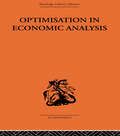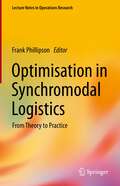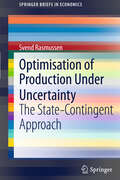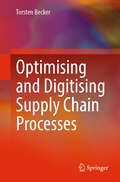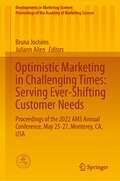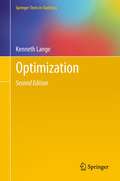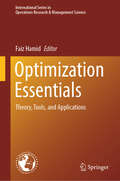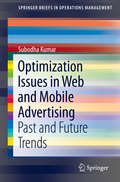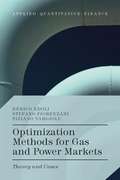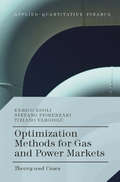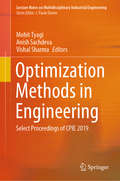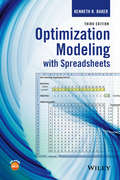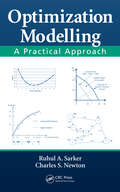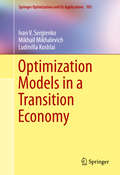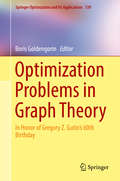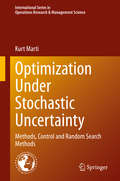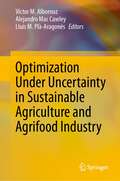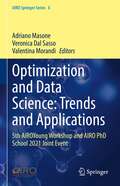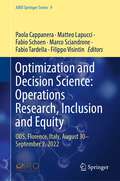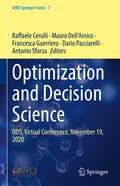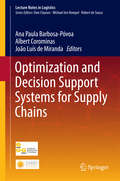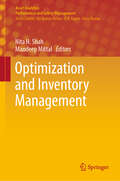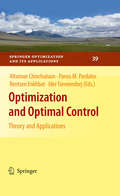- Table View
- List View
Optimisation in Economic Analysis
by Gordon MillsOne of the fundamental economic problems is one of making the best use of limited resources. As a result, mathematical optimisation methods play a crucial role in economic theory. Covering the use of such methods in applied and policy contexts, this book deals not only with the main techniques (linear programming, nonlinear optimisation and dynamic programming), but also emphasizes the art of model-building and discusses fields such as optimisation over time.
Optimisation in Synchromodal Logistics: From Theory to Practice (Lecture Notes in Operations Research)
by Frank PhillipsonThis book introduces the advances in synchromodal logistics and provides a framework to classify various optimisation problems in this field. It explores the application of this framework to solve a broad range of problems, such as problems with and without a central decision-maker, problems with and without full information, deterministic problems, problems coping with uncertainty, optimisation of a full network design problem. It covers theoretical constructs, such as discrete optimisation, robust optimisation, optimisation under uncertainty, multi-objective optimisation and agent based equilibrium models. Moreover, practical elaborated use cases are presented to deepen understanding. The book gives both researchers and practitioners a good overview of the field of synchromodal optimisation problems and offers the reader practical methods for modelling and problem-solving.
Optimisation of Production Under Uncertainty
by Svend RasmussenThe book provides a short review of the classical approach to planning and decision making under uncertainty. It further explains the concept of state-contingent goods, and it extends earlier work on the state-contingent approach to describing production under uncertainty to the problems involved in optimising production under uncertainty.
Optimising and Digitising Supply Chain Processes
by Torsten BeckerProduction and logistics companies can achieve significant competitive advantage with their supply chain and production processes. This book provides managers, practitioners, consultants and students with a comprehensive understanding of process optimisation. It covers a wide range of tools, methods and tried-and-tested procedures for improving performance in these areas. The methodological toolbox from the various optimisation philosophies - Lean Production, Supply Chain, Six Sigma, Continuous Improvement Processes and Theory of Constraints - is presented and evaluated. Digital tools for process analysis, such as process mining, are described. Procedures and approaches are described for the individual steps of comprehensive process optimisation. These include process analysis methods such as ARIS, value stream mapping, the supply chain operations reference model (SCOR), and numerous process evaluation methods. One focus of the book is the presentation of pragmatic implementation approaches and procedures, including agile project management methods. Three project examples from the author's consulting practice are used to describe the results of complex changes. The book contains many hints and tips for extensive process improvements. The author has many years of industry experience and has been advising leading companies in various sectors for over 25 years. It presents end-to-end improvement approaches for systematically increasing supply chain and production performance. Using tried-and-tested tools and examples, the reader learns how to successfully handle supply chain projects from the initial idea to implementation. Based on the author's implementation experience, a set of methods covers all aspects of production and supply chain process optimisation. With the detailed procedures, the book offers recommendations on running supply chain projects efficiently and successfully and which tools effectively support the work in the individual project phases.
Optimistic Marketing in Challenging Times: Proceedings of the 2022 AMS Annual Conference, May 25-27, Monterey, CA, USA (Developments in Marketing Science: Proceedings of the Academy of Marketing Science)
by Juliann Allen Bruna JochimsMarketing is one of the most optimistic business disciplines with the goal of serving consumers or organizations and increasing customer satisfaction and happiness. The COVID-19 pandemic has disrupted the optimism of the world, thus hindering these marketing goals. This book explore the challenges faced by marketers during and post-COVID-19 and offers strategies for marketers to invoke a sense of optimism as the world enters the “new normal”. It provides success stories and regional case studies to offer marketers new ways in which to serve consumers and satisfy their needs. It also acknowledges the role digital technology and innovation have played a crucial role during these dark times and how they impact current and future customer experiences. Founded in 1971, the Academy of Marketing Science is an international organization dedicated to promoting timely explorations of phenomena related to the science of marketing in theory, research, and practice. Among its services to members and the community at large, the Academy offers conferences, congresses, and symposia that attract delegates from around the world. Presentations from these events are published in this Proceedings series, which offers a comprehensive archive of volumes reflecting the evolution of the field. Volumes deliver cutting-edge research and insights, complementing the Academy’s flagship journals, the Journal of the Academy of Marketing Science (JAMS) and AMS Review.
Optimization
by Kenneth LangeFinite-dimensional optimization problems occur throughout the mathematical sciences. The majority of these problems cannot be solved analytically. This introduction to optimization attempts to strike a balance between presentation of mathematical theory and development of numerical algorithms. Building on students' skills in calculus and linear algebra, the text provides a rigorous exposition without undue abstraction. Its stress on statistical applications will be especially appealing to graduate students of statistics and biostatistics. The intended audience also includes students in applied mathematics, computational biology, computer science, economics, and physics who want to see rigorous mathematics combined with real applications. In this second edition the emphasis remains on finite-dimensional optimization. New material has been added on the MM algorithm, block descent and ascent, and the calculus of variations. Convex calculus is now treated in much greater depth. Advanced topics such as the Fenchel conjugate, subdifferentials, duality, feasibility, alternating projections, projected gradient methods, exact penalty methods, and Bregman iteration will equip students with the essentials for understanding modern data mining techniques in high dimensions.
Optimization Essentials: Theory, Tools, and Applications (International Series in Operations Research & Management Science #353)
by Faiz HamidThis book explores recent developments and exciting challenges in operations research and mathematical optimization. It provides the following in a unified and carefully developed presentation: (a) novel problems that have arisen in the real-life optimization domain, highlighting the challenges in each problem; (b) significant methodological advances for solving existing optimization problems, with a special emphasis on large scale problems. The book assumes a decent understanding of matrix algebra, linear and integer programming, non-linear programming, computational complexity, and graph theory. Each chapter in this book starts with an introduction to the underlying optimization technique. It then explores a real-life case study to which the technique will be applied. The objective is to demonstrate how the underlying technique can be utilized to solve a challenging problem. The chapters offer details on how to formulate a research problem into a formal optimization model, reformulate or transform it (if required) to improve computational tractability, and apply necessary customizations to the optimization technique specific to the underlying problem to derive an optimal or near-optimal solution. The book covers various state-of-the-art methods (both exact and heuristics) and modelling approaches in sync with the current research trends, which are still not discussed in typical graduate-level textbooks. Applications covered in the book span the realms of resource planning, telecommunications, scheduling, logistics, education, environmental conservation, and many others. It is thus a valuable resource for post-graduate students of operations research and mathematical optimization. It also serves as a valuable reference for researchers who wish to explore various optimization techniques as part of their research methodologies. The learning from the book should enable the professionals to apply optimization theory and algorithms to their particular field of interest.
Optimization Issues in Web and Mobile Advertising
by Subodha KumarThis book provides a comprehensive overview of optimization issues and models in web and mobile advertising. It begins by discussing the evolution of web advertising over time. This is followed by the discussion of prominent pricing models. The reader is provided with a basic overview of different optimization issues involved in web advertising. The earlier models mainly considered the problem of scheduling ads competing to be placed on a web page. Here, the ads were specified by geometry and display frequency, and both of these factors were considered in developing a solution to the advertisement scheduling problem. These models were similar in nature to the problem of scheduling ads on newspaper or television, but the pricing structure in these models were different from those in newspaper or television ads. As the web advertising evolved, the initial models were augmented by considering how the schedule of ads is changed based on individual user click behavior. Thus, these models considered personalization in web advertising. The book also presents methods to help solve these models. More recently, there has been tremendous growth in mobile advertising. This book also provides the details of business model in mobile advertising, and presents solutions for the optimization problem involved in mobile advertising. Additionally this book looks to key future trends in web and mobile advertising (such as Fading Ads) and the associat ed challenges that come with it. For instance, the future trends in pricing models are more towards action-based pricing rather than impression-based pricing.
Optimization Methods for Gas and Power Markets: Theory and Cases (Applied Quantitative Finance)
by Stefano Fiorenzani Enrico Edoli Tiziano VargioluAs power and gas markets are becoming more and more mature and globally competitive, the importance of reaching maximum potential economic efficiency is fundamental in all the sectors of the value chain, from investments selection to asset optimization, trading and sales. Optimization techniques can be used in many different fields of the energy industry, in order to reduce production and financial costs, increase sales revenues and mitigate all kinds of risks potentially affecting the economic margin. For this reason the industry has now focused its attention on the general concept of optimization and to the different techniques (mainly mathematical techniques) to reach it. Optimization Methods for Gas and Power Markets presents both theoretical elements and practical examples for solving energy optimization issues in gas and power markets. Starting with the theoretical framework and the basic business and economics of power and gas optimization, it quickly moves on to review the mathematical optimization problems inherent to the industry, and their solutions – all supported with examples from the energy sector. Coverage ranges from very long-term (and capital intensive) optimization problems such as investment valuation/diversification to asset (gas and power) optimization/hedging problems, and pure trading decisions.
Optimization Methods for Gas and Power Markets: Theory and Cases (Applied Quantitative Finance)
by Stefano Fiorenzani Enrico Edoli Tiziano VargioluAs power and gas markets are becoming more and more mature and globally competitive, the importance of reaching maximum potential economic efficiency is fundamental in all the sectors of the value chain, from investments selection to asset optimization, trading and sales. Optimization techniques can be used in many different fields of the energy industry, in order to reduce production and financial costs, increase sales revenues and mitigate all kinds of risks potentially affecting the economic margin. For this reason the industry has now focused its attention on the general concept of optimization and to the different techniques (mainly mathematical techniques) to reach it.Optimization Methods for Gas and Power Markets presents both theoretical elements and practical examples for solving energy optimization issues in gas and power markets. Starting with the theoretical framework and the basic business and economics of power and gas optimization, it quickly moves on to review the mathematical optimization problems inherent to the industry, and their solutions – all supported with examples from the energy sector. Coverage ranges from very long-term (and capital intensive) optimization problems such as investment valuation/diversification to asset (gas and power) optimization/hedging problems, and pure trading decisions.This book first presents the readers with various examples of optimization problems arising in power and gas markets, then deals with general optimization problems and describes the mathematical tools useful for their solution. The remainder of the book is dedicated to presenting a number of key business cases which apply the proposed techniques to concrete market problems. Topics include static asset optimization, real option evaluation, dynamic optimization of structured products like swing, virtual storage or virtual power plant contracts and optimal trading in intra-day power markets. As the book progresses, so too does the level of mathematical complexity, providing readers with an appreciation of the growing sophistication of even common problems in current market practice.Optimization Methods for Gas and Power Markets provides a valuable quantitative guide to the technicalities of optimization methodologies in gas and power markets; it is essential reading for practitioners in the energy industry and financial sector who work in trading, quantitative analysis and energy risk modeling.
Optimization Methods in Engineering: Select Proceedings of CPIE 2019 (Lecture Notes on Multidisciplinary Industrial Engineering)
by Vishal Sharma Anish Sachdeva Mohit TyagiThis book comprises peer-reviewed contributions from the International Conference on Production and Industrial Engineering (CPIE) 2019. This volume provides insights into the current scenario and advances in the domain of industrial and production engineering in the context of optimum value. Optimization and its applicability in various areas of production and industrial engineering like selection of designing parameters and machining parameters, decisions related to conditions of optimum process/operation parameters, behavior of response variables, facilities planning and management, transportation and supply chain management, quality engineering, reliability and maintenance, product design and development, human factors and ergonomics, service system and service management, waste management, sustainable manufacturing and operations, systems design, and performance measurement are discussed in the book. Given the range of topics covered, this book can be useful for students, researchers, and professionals interested in latest optimization techniques related to industrial and production engineering.
Optimization Methods in Finance
by Gerard Cornuejols Reha TütüncüOptimization models play an increasingly important role in financial decisions. This is the first textbook devoted to explaining how recent advances in optimization models, methods and software can be applied to solve problems in computational finance more efficiently and accurately. Chapters discussing the theory and efficient solution methods for all major classes of optimization problems alternate with chapters illustrating their use in modeling problems of mathematical finance. The reader is guided through topics such as volatility estimation, portfolio optimization problems and constructing an index fund, using techniques such as nonlinear optimization models, quadratic programming formulations and integer programming models respectively. The book is based on Master's courses in financial engineering and comes with worked examples, exercises and case studies. It will be welcomed by applied mathematicians, operational researchers and others who work in mathematical and computational finance and who are seeking a text for self-learning or for use with courses.
Optimization Modeling with Spreadsheets
by Kenneth R. BakerReflects the latest applied research and features state-of-the-art software for building and solving spreadsheet optimization modelsThoroughly updated to reflect the latest topical and technical advances in the field, Optimization Modeling with Spreadsheets, Second Edition continues to focus on solving real-world optimization problems through the creation of mathematical models and the use of spreadsheets to represent and analyze those models. Developed and extensively classroom-tested by the author, the book features a systematic approach that equips readers with the skills to apply optimization tools effectively without the need to rely on specialized algorithms.This new edition uses the powerful software package Risk Solver Platform (RSP) for optimization, including its Evolutionary Solver, which employs many recently developed ideas for heuristic programming. The author provides expanded coverage of integer programming and discusses linear and nonlinear programming using a systematic approach that emphasizes the use of spreadsheet-based optimization tools. The Second Edition also features:Classifications for the various problem types, providing the reader with a broad framework for building and recognizing optimization modelsNetwork models that allow for a more general form of mass balanceA systematic introduction to Data Envelopment Analysis (DEA)The identification of qualitative patterns in order to meaningfully interpret linear programming solutionsAn introduction to stochastic programming and the use of RSP to solve problems of this typeAdditional examples, exercises, and cases have been included throughout, allowing readers to test their comprehension of the material. In addition, a related website features Microsoft Office® Excel files to accompany the figures and data sets in the book.With its accessible and comprehensive presentation, Optimization Modeling with Spreadsheets, Second Edition is an excellent book for courses on deterministic models, optimization, and spreadsheet modeling at the upper-undergraduate and graduate levels. The book can also serve as a reference for researchers, practitioners, and consultants working in business, engineering, operations research, and management science.
Optimization Modelling: A Practical Approach
by Ruhul Amin Sarker Charles S. NewtonAlthough a useful and important tool, the potential of mathematical modelling for decision making is often neglected. Considered an art by many and weird science by some, modelling is not as widely appreciated in problem solving and decision making as perhaps it should be. And although many operations research, management science, and optimization
Optimization Models in a Transition Economy
by Ivan V. Sergienko Mikhail Mikhalevich Ludmilla KoshlaiThis book opens new avenues in understanding mathematical models within the context of a transition economy. The exposition lays out the methods for combining different mathematical structures and tools to effectively build the next model that will accurately reflect real world economic processes. Mathematical modeling of weather phenomena allows us to forecast certain essential weather parameters without any possibility of changing them. By contrast, modeling of transition economies gives us the freedom to not only predict changes in important indexes of all types of economies, but also to influence them more effectively in the desired direction. Simply put: any economy, including a transitional one, can be controlled. This book is useful to anyone who wants to increase profits within their business, or improve the quality of their family life and the economic area they live in. It is beneficial for undergraduate and graduate students specializing in the fields of Economic Informatics, Economic Cybernetics, Applied Mathematics and Large Information Systems, as well as for professional economists, and employees of state planning and statistical organizations.
Optimization Problems in Graph Theory: In Honor of Gregory Z. Gutin's 60th Birthday (Springer Optimization and Its Applications #139)
by Boris GoldengorinThis book presents open optimization problems in graph theory and networks. Each chapter reflects developments in theory and applications based on Gregory Gutin’s fundamental contributions to advanced methods and techniques in combinatorial optimization. Researchers, students, and engineers in computer science, big data, applied mathematics, operations research, algorithm design, artificial intelligence, software engineering, data analysis, industrial and systems engineering will benefit from the state-of-the-art results presented in modern graph theory and its applications to the design of efficient algorithms for optimization problems. Topics covered in this work include:· Algorithmic aspects of problems with disjoint cycles in graphs· Graphs where maximal cliques and stable sets intersect· The maximum independent set problem with special classes· A general technique for heuristic algorithms for optimization problems · The network design problem with cut constraints· Algorithms for computing the frustration index of a signed graph· A heuristic approach for studying the patrol problem on a graph· Minimum possible sum and product of the proper connection number· Structural and algorithmic results on branchings in digraphs · Improved upper bounds for Korkel--Ghosh benchmark SPLP instances
Optimization Under Stochastic Uncertainty: Methods, Control and Random Search Methods (International Series in Operations Research & Management Science #296)
by Kurt MartiThis book examines application and methods to incorporating stochastic parameter variations into the optimization process to decrease expense in corrective measures. Basic types of deterministic substitute problems occurring mostly in practice involve i) minimization of the expected primary costs subject to expected recourse cost constraints (reliability constraints) and remaining deterministic constraints, e.g. box constraints, as well as ii) minimization of the expected total costs (costs of construction, design, recourse costs, etc.) subject to the remaining deterministic constraints.After an introduction into the theory of dynamic control systems with random parameters, the major control laws are described, as open-loop control, closed-loop, feedback control and open-loop feedback control, used for iterative construction of feedback controls. For approximate solution of optimization and control problems with random parameters and involving expected cost/loss-type objective, constraint functions, Taylor expansion procedures, and Homotopy methods are considered, Examples and applications to stochastic optimization of regulators are given. Moreover, for reliability-based analysis and optimal design problems, corresponding optimization-based limit state functions are constructed. Because of the complexity of concrete optimization/control problems and their lack of the mathematical regularity as required of Mathematical Programming (MP) techniques, other optimization techniques, like random search methods (RSM) became increasingly important.Basic results on the convergence and convergence rates of random search methods are presented. Moreover, for the improvement of the – sometimes very low – convergence rate of RSM, search methods based on optimal stochastic decision processes are presented. In order to improve the convergence behavior of RSM, the random search procedure is embedded into a stochastic decision process for an optimal control of the probability distributions of the search variates (mutation random variables).
Optimization Under Uncertainty in Sustainable Agriculture and Agrifood Industry
by Lluis M. Plà-Aragonés Víctor M. Albornoz Alejandro Mac CawleyThis book explores optimization under uncertainty and related applications in agriculture, sustainable supply chains and the agrifood industry. Rapid changes in the primary sector are leading to more and more industrialized structures, which require optimization methods in order to cope with today’s challenges. Addressing uncertainty in the agrifood industry may lead to more robust supply chain designs or to diversified risk. Sustainability requires interaction with the environmental or social sciences. This book bridges the gap between optimization theory, uncertainty, sustainability and primary-sector applications (mainly in the agriculture and food industry, but also fisheries, forestry and natural resources in general). Although it has been a major challenge for the operations research community, this urgently needed interdisciplinary collaboration is not adequately covered in most current curricula in applied mathematics, economics or (agronomic/industrial/forest) engineering. This book highlights research that can help fill this gap. The individual chapters cover applications of stochastic integer linear programming and multicriteria decision methods in agriculture. The topics addressed include uncertainty in areas such as the sugar cane industry, pig farming, and cold storage for perishable products. Large-scale sustainable food production is a growing concern; this book offers solutions to help meet global demand in agriculture by using and improving the methods of optimization theory and operations research.
Optimization and Data Science: 5th AIROYoung Workshop and AIRO PhD School 2021 Joint Event (AIRO Springer Series #6)
by Adriano Masone Veronica Dal Sasso Valentina MorandiThis proceedings volume collects contributions from the 5th AIRO Young Workshop and AIRO PhD School 2021 joint event on “Optimization and Data Science: Trends and Applications”, held online, from February 8 to 12, 2021. The joint event was organized by AIROYoung representatives and the Operations Research Group of the Department of Electrical Engineering and Information Technology of the University “Federico II” of Naples.The selected contributions represent the state-of-the-art knowledge related to different branches of research, such as data science, machine learning and combinatorial optimization. Therefore, this book is primarily addressed to researchers and PhD students of the operations research community. However, due to its interdisciplinary content, it will be of high interest for other closely related research communities. Moreover, this volume not only presents theoretical results but also covers real applications in computer science, engineering, economics, healthcare, and logistics, making it interesting for practitioners facing complex decision-making problems in these areas.
Optimization and Decision Science: ODS, Florence, Italy, August 30—September 2, 2022 (AIRO Springer Series #9)
by Paola Cappanera Filippo Visintin Fabio Schoen Marco Sciandrone Matteo Lapucci Fabio TardellaThis volume collects peer-reviewed short papers presented at the Optimization and Decision Science conference (ODS 2022) held in Florence (Italy) from August 30th to September 2nd, 2022, organized by the Global Optimization Laboratory within the University of Florence and AIRO (the Italian Association for Operations Research).The book includes contributions in the fields of operations research, optimization, problem solving, decision making and their applications in the most diverse domains. Moreover, a special focus is set on the challenging theme Operations Research: inclusion and equity.The work offers 30 contributions, covering a wide spectrum of methodologies and applications. Specifically, they feature the following topics: (i) Variational Inequalities, Equilibria and Games, (ii) Optimization and Machine Learning, (iii) Global Optimization, (iv) Optimization under Uncertainty, (v) Combinatorial Optimization, (vi) Transportation and Mobility, (vii) Health Care Management, and (viii) Applications.This book is primarily addressed to researchers and PhD students of the operations research community. However, due to its interdisciplinary content, it will be of high interest for other closely related research communities.
Optimization and Decision Science: ODS, Virtual Conference, November 19, 2020 (AIRO Springer Series #7)
by Dario Pacciarelli Antonio Sforza Raffaele Cerulli Mauro Dell’Amico Francesca GuerrieroThis book collects selected contributions from the international conference “Optimization and Decision Science” (ODS2020), which was held online on November 19, 2020, and organized by AIRO, the Italian Operations Research Society. The book offers new and original contributions on optimization, decisions science and prescriptive analytics from both a methodological and applied perspective, using models and methods based on continuous and discrete optimization, graph theory and network optimization, analytics, multiple criteria decision making, heuristics, metaheuristics, and exact methods.In addition to more theoretical contributions, the book chapters describe models and methods for addressing a wide diversity of real-world applications, spanning health, transportation, logistics, public sector, manufacturing, and emergency management.Although the book is aimed primarily at researchers and PhD students in the Operations Research community, the interdisciplinary content makes it interesting for practitioners facing complex decision-making problems in the afore-mentioned areas, as well as for scholars and researchers from other disciplines, including artificial intelligence, computer sciences, economics, mathematics, and engineering.
Optimization and Decision Support Systems for Supply Chains
by Ana Paula Barbosa Póvoa Albert Corominas João Luís de MirandaThis contributed volume presents a state-of-the-art collection of material in supply chain management including industry-based case studies such as petrochemical, pharmaceutical, manufacturing and reverse logistics topics. Moreover, the book covers sustainability issues, accounting topics as well as optimization approaches. The target audience primarily comprises industry managers and practitioners in the field of supply chain management the book may also be beneficial for graduate students.
Optimization and Expansion at OpenTable
by Benjamin Edelman Karen L. WebsterOpenTable considers adjustments to increase its benefits to merchants, including a novel payments service that lets customers skip the multi-step process of using a credit card.
Optimization and Inventory Management (Asset Analytics)
by Nita H. Shah Mandeep MittalThis book discusses inventory models for determining optimal ordering policies using various optimization techniques, genetic algorithms, and data mining concepts. It also provides sensitivity analyses for the models’ robustness. It presents a collection of mathematical models that deal with real industry scenarios. All mathematical model solutions are provided with the help of various optimization techniques to determine optimal ordering policy. The book offers a range of perspectives on the implementation of optimization techniques, inflation, trade credit financing, fuzzy systems, human error, learning in production, inspection, green supply chains, closed supply chains, reworks, game theory approaches, genetic algorithms, and data mining, as well as research on big data applications for inventory management and control. Starting from deterministic inventory models, the book moves towards advanced inventory models. The content is divided into eight major sections: inventory control and management – inventory models with trade credit financing for imperfect quality items; environmental impact on ordering policies; impact of learning on the supply chain models; EOQ models considering warehousing; optimal ordering policies with data mining and PSO techniques; supply chain models in fuzzy environments; optimal production models for multi-items and multi-retailers; and a marketing model to understand buying behaviour. Given its scope, the book offers a valuable resource for practitioners, instructors, students and researchers alike. It also offers essential insights to help retailers/managers improve business functions and make more accurate and realistic decisions.
Optimization and Optimal Control
by Panos M. Pardalos Ider Tseveendorj Altannar Chinchuluun Rentsen EnkhbatOptimization and optimal control are the main tools in decision making. Because of their numerous applications in various disciplines, research in these areas is accelerating at a rapid pace. "Optimization and Optimal Control: Theory and Applications" brings together the latest developments in these areas of research as well as presents applications of these results to a wide range of real-world problems. This volume can serve as a useful resource for researchers, practitioners, and advanced graduate students of mathematics and engineering working in research areas where results in optimization and optimal control can be applied.
